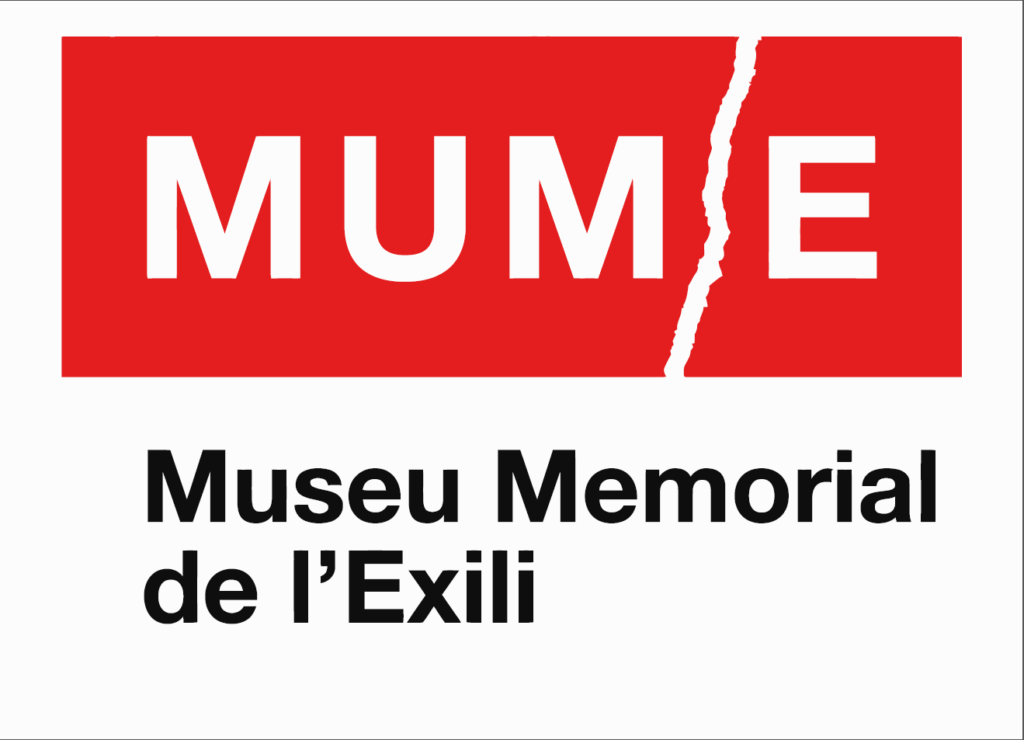Exile Memorial Museum (MUME)
MUME is an interpretation center located in La Jonquera committed to remembering the exiles caused by the Spanish Civil War, with the aim of dedicating a space for memory, history and critical reflection. It is located in the same border crossing where most of the exiles fled. The management board of the museum is a consortium made up of the Generalitat de Catalunya (Democratic Memorial), the City Council of La Jonquera, the Regional Council of Alt Empordà and the University of Girona. It has been part of the Network of Sites of Memory of Catalonia since its creation in 2010.
The museum combines museistic functions, through permanent and temporary exhibitions, with those of historical research and pedagogical dissemination, linking history with the present. Its main objectives are the dissemination of the memory of the Republican exile without neglecting the other exiles, mainly of the contemporary period. Another of its ambitions is to culturally encourage the municipality of La Jonquera.
It opened its doors on February 16th, 2008, being the first museum facility dedicated to the preservation of the memory of the Republican exile and its legacy.
Go to the virtual tour
So Close
So Close is a research funded by the H2020 Program of the European Commission that aims to collect the experiences of refugees in Europe in the past and today, as well as to design interactive tools for the preservation of the cultural heritage of forced migrations. Promoted by the Autonomous University of Barcelona (UAB) and with a duration of three years (January 2020-December 2022), So Close counts with the participation of 9 agents from 5 different countries, including the Exile Memorial Museum, which is the cultural institution responsible for the deployment of the project in Catalonia.
The purpose of this research is to enhance social cohesion in Europe by sharing the cultural heritage of historical and current forced migrations. Through So Close, each cultural institution has developed a process of co-creation of educational, cultural and academic materials that favor mutual knowledge between the experiences of exile lived by local communities in the 20th century and those lived today by people who have more recently arrived in these countries. In the case of MUME, the historical reference is the Retreat, the Republican exodus that took place at the end of the Spanish Civil War.
The co-creation process began with the elaboration of 50 interviews in each of the participating cultural institutions to identify the main concerns around this topic. The conclusions of the interview phase were taken to 4 focus groups to finish distilling what was most important to highlight and, thus, to draw a first proposal for the projects that we would carry out. From there, work began on the design of digital tools to support the projects in the different countries and to give shape to the proposals that emerged from the research phase.
As a result of this process, MUME presents the Storymap entitled “Traces from yesterday and today” and the Webdoc (or multimedia documentary) “It could be you! “. The contents of these two projects seek to relate the experiences of the people who went into exile in 1939 with those of people who, more recently, have left their homes in different places of origin and with whom we now share neighborhoods.
Watch the presentation video here and here
Traces from yesterday and today
Traces from yesterday and today is a Storymap that aims to show the experiences of exile from different points of view and in its different stages.
Artistic Residences is the graphic representation of the exile route of two artists: Roser Bru and Javier Zamora. She exiled in 1939 as a result of the Spanish Civil War, he in 2017 due to the situation of violence in El Salvador. Bru goes from Barcelona to Santiago de Chile, passing through France; Zamora from El Salvador to L’Escala, with several stops along the way. This map shows, from the individual’s point of view, different experiences about life before exile, the causes of exile, the arrival in the new country and how art can become a refuge.
Past-present dialogue is the testimony of the route through spaces of memory of the Republican exile that took place on February 26, 2022 with people of different origins who have lived forced migrations during the last two decades. Reflections on war, borders, refugee camps and solidarity are collected. This map presents the views of a group of people who speak in first person about the routes of exile and their traces.
At destination the route continues is a small sample of the existing resources around the four axes that the participants of So Close described as the main challenges to be faced once one arrives in the country of destination. With the intention of involving the community at destination, this map links to another map in which anyone can contribute with their knowledge about useful resources for people who have already arrived, for those who will arrive and for those who want to get to know or get involved in these realities.
Acknowledgements
The co-creation process of this Storymap has counted with the participation of many people at different levels, all of them essential. Some people have provided contacts and specific information or have shared their opinions on the news they received about the project. Others participated in the focus groups that were the seed for the design of this Storymap and others actively participated in the work meetings, sharing their experiences or in the creation and compilation of contents. We are grateful for the work of each and every one of the people and entities that have made this project possible, especially to:
Agna Aguadé Bru, Lina Al., Sergi Barba, Dolors Bordas, Isabel Cortes, Shola Rashid, Lema Rashid, Nour Salameh, Diana Tchamitchian, Yakob Tyara, Javier Zamora, Jaume Durà Tohus (advocat responsable del servei jurídic CEAR PV), Helena Moço Lopes (Abrazo Cultural), Xavier Pujol, Jorge Ramos Tolosa, Fundación Roser Bru, Mahmoud Al Ahmad, Pablo Alonso (Refugees Welcome), Imma Boj (Museu d’Història de la Immigració de Catalunya), José Carlos Cabrera Medina (Ruta Mediterránea – Red de la Fundación Anna Lindh), Adam, Oriol López (Chapter 2), Sílvia Paneque, Núria Ramos (Ranura), Laura Riba (Fundació Autònoma Solidària), Alèxia Rué, Gemma Simón Muntané (Àrea Educativa Memorial Democràtic), Júlia Trias, Sebastià Valle (Equip de Rescat i Emergències de Catalunya-EREC) and Belal Younes.




